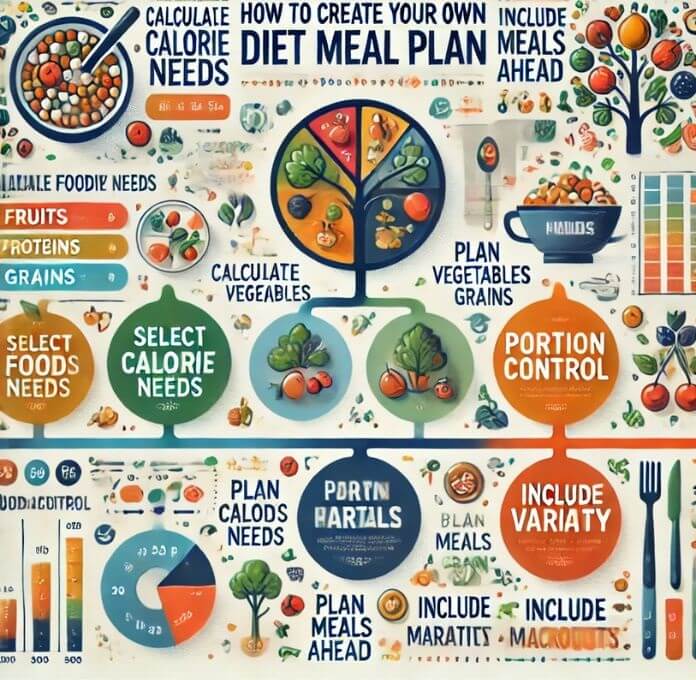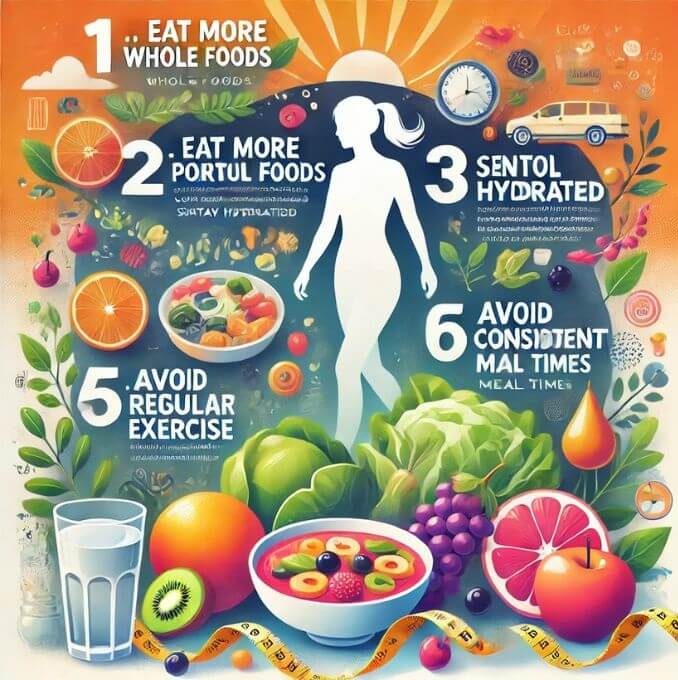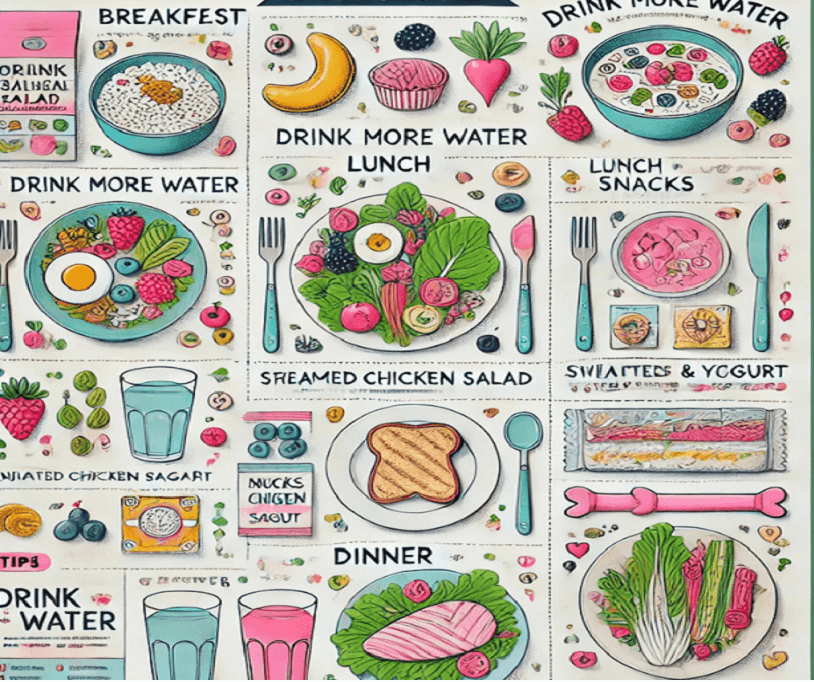Losing weight can be difficult to get started on, especially if you’ve never tried it before. But with the right tools and planning, you can reach your weight loss goals and even enjoy the process. This article includes a weight loss diet plan for beginners, with helpful tips and advice from dietitians to help you find your way to a healthy eating plan as well as a complete 7-day meal plan designed for weight loss. Whether you’re looking to shed a few pounds or make major changes to your life, this guide is a must-read.
What is a meal plan for weight loss?
A weight loss meal plan lists specific foods and serving sizes that will help people cut calories while still ensuring they get enough nutrients. The plan helps you make good food choices throughout the week, making it easier to stick to a healthy diet.
Meal plans typically include plenty of fruits, vegetables, lean protein, and whole grains, and are low in processed foods that are high in sugar and bad fats. When people follow these structured rules, they can control how many calories they eat without feeling deprived.
Why Follow a 7-Day Meal Plan?
A 7-day meal plan helps you stay on track and organized as you lose weight. Especially for those who are just starting out on a diet, planning your meals ahead of time takes the guesswork out of daily food choices, making dieting less stressful.
This short-term approach allows people to see results quickly, which often motivates them to stay on track with their long-term weight loss goals. Sticking to a weekly plan makes it easier to change your eating habits so you don’t fall into bad eating habits.
How many calories should you consume daily?
The number of calories you should consume each day depends on your age, gender, amount of activity, and weight loss goals, among other things. In general, people need between 1,600 and 2,400 calories per day to stay healthy. This means that cutting 500 to 750 calories can help you safely lose fat at a rate of about a pound per week.
Talking to a dietitian can help you figure out what you need and make sure you’re not cutting too many calories, which can slow down your metabolism or leave you lacking nutrients.
What does a successful weight loss meal plan look like?
A good meal plan for weight loss combines macronutrients (carbs, protein, and fat) and focuses on whole foods that make you feel full without giving you too many calories. As an example:
- For breakfast, you could have cereal with berries on top.
- Grilled chicken over mixed vegetables with vinaigrette could be a great lunch.
- Oven-baked salmon can go with steamed broccoli and rice for dinner.
Snacks like Greek yogurt or nuts can help keep you energized throughout the day and prevent you from overeating at the main meal.
How to Create Your Own Diet Meal Plan?

There are several steps to creating your own meal plan:
- Figure out how many calories you need: You can use an online tool or talk to a dietitian for help.
- Eat whole foods: Choose foods that are high in nutrients, such as fruits, vegetables, whole grains, lean protein (like chicken or beans), and healthy fats (like avocado).
- Make sure your meals are balanced: Each one should contain both a source of energy and a carbohydrate rich in fiber.
- Prepare ahead of time: Batch cooking meals during the week can save you time.
- Be flexible: If you feel hungry or have a social event coming up, you can make changes. This will help you stick to your plan in the long run.
What are the best foods for sustainable weight loss?
Foods that are high in nutrients but low in calories are very important for long-term weight loss:
Greens: Spinach and kale are low in calories but fill you up.
Lean protein: Eating chicken breast or tofu can help you keep your muscle while you lose fat.
Whole grains: Quinoa and brown rice are good sources of fiber, which helps your body absorb food.
Adding these foods to your regular diet will not only help your physical health, but it will also help your mental health.
How does exercise complement your meal plan?
Adding exercise to your diet makes it more effective because it increases your metabolism, which speeds up the body’s fat-burning processes. This is a big part of reaching your long-term weight management goals.
For beginners, you may need to start with simple activities like brisk walking three times a week and strength training sessions focusing on major muscle groups two days a week. Getting into a pattern will help you get fitter over time.
Can people with diabetes follow this meal plan?
Yes! People with diabetes can follow a well-balanced 7-day meal plan focusing on low-glycemic index foods that prevent blood sugar spikes while still encouraging overall healthy weight management strategies—making sure you have good control over your carbohydrates is key here. !
Working closely with a medical professional ensures that safety is always a top priority when making changes to a person’s diet. Knowing your own needs when managing diabetes through nutrition will lead to better results.
What are some tips from dietitians about losing weight?

Dietitians say those looking to lose weight should follow these important tips:
- Stay hydrated: Drinking plenty of water helps your body digest food and makes you feel less hungry.
- Practice mindful eating: Focusing on food alone can help you control how much you eat!
- Get enough sleep: Not getting enough rest can disrupt the hormones that control appetite, which can later lead to eating habits you don’t want.
Using these methods increases the chances of success for people of all ages who want to live a healthier lifestyle overall!
How to maintain long-term weight loss success?
Establishing lasting habits is more important than quick fixes for long-term success! How to do it:
- Keep learning about nutrition: Being well-informed protects people from false information about food!
- Set goals that are achievable: Setting small, achievable goals instead of big, unrealistic goals will keep you motivated in the long run.
- Celebrate non-scale victories: Noticing gains that aren’t measured in numbers encourages positive behavior changes over time, which keeps people engaged.
In conclusion:
It can be difficult to start losing weight, but a well-organized 7-day meal plan can help you stay on track and keep you motivated to reach your goals. By learning the basics of calorie counting, focusing on whole foods, and getting some exercise, you can create healthy eating habits that last.
Remember that consistency is key; small changes over time can make a big difference. When you’re trying to lose weight, you may want to talk to a dietitian to get help specific to your needs. You can reach your weight loss goals and still enjoy delicious food along the way if you’re dedicated and use the right strategies.

